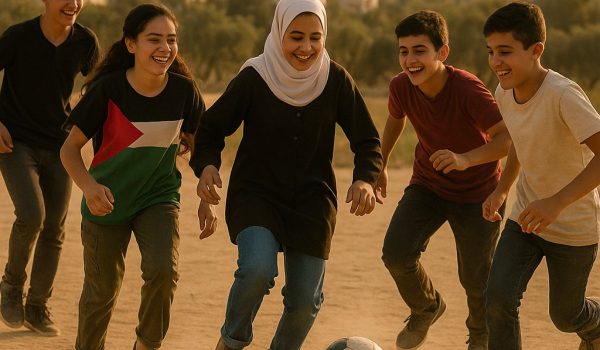On a soccer field or basketball court, something powerful happens. Teenagers who may have never spoken to each other before start working as a team. They pass, defend, and cheer each other on. The game gives them a shared goal. It gives them space to connect, compete, and grow without needing to agree on everything else.
In Palestine, where young people often face stress, pressure, and limited opportunities, sports offer more than recreation. They offer a sense of belonging. They offer a break from daily tension and a way to build relationships. Through sports, youth find common ground that goes beyond where they live, what they believe, or what they’ve been through.
How This Article Connects Sports to Unity
This article looks at how sports bring Palestinian youth together:
- How team sports create shared goals and break down walls
- Why play helps build trust, confidence, and communication
- Stories from programs that use sports to bridge differences
- The role of coaches and mentors in shaping supportive spaces
- How sports prepare young people for leadership and cooperation
These moments of connection may start with a ball, but they carry lessons that last long after the game ends.
Building Trust Through Play
Trust doesn’t happen overnight. But on a sports team, it starts with something small. You pass the ball. Someone passes it back. Over time, those tiny moments add up. Teammates learn to rely on each other, not just for the win, but for encouragement, support, and effort.
For Palestinian youth, especially those growing up in areas divided by walls, checkpoints, or political lines, trust can be hard to build. Sports provide a space where that trust can grow naturally. There’s no need to start with deep conversation. Shared activity does the talking.
Games offer a level playing field. Everyone wears the same jersey. Everyone has a role. And in that setting, young people start to see each other as teammates, not strangers.
Communication Without Words
In sports, communication isn’t always verbal. A look, a gesture, or a high-five can say more than a speech. For youth from different backgrounds or who speak different dialects, that makes a big difference.
Even if players don’t fully understand each other’s words, they understand the flow of the game. They learn to read each other’s movements and adapt. That kind of communication builds respect and flexibility.
Sports also help shy or quiet youth find their voice. Maybe a player who rarely speaks in class becomes the loudest on the field, calling plays and encouraging others. These changes often show up later in school, family life, or other group settings.
Confidence and Belonging
Feeling like you belong is not always easy, especially for young people facing displacement, discrimination, or fear. Sports create a place where effort matters more than background.
Scoring a goal, blocking a shot, or making a great pass can lift a player’s confidence in ways that stick. These wins, however small, remind youth that they have value. That they can contribute. That they matter.
Even when games get intense, the structure of sports teaches boundaries. Rules exist. Fouls happen. But the game goes on. That lesson is powerful. It teaches that conflict doesn’t have to end in division. There are ways to move forward.
Coaches as Role Models
Coaches hold a special place in this process. A good coach sees more than talent. They see potential. They create safe spaces where mistakes are allowed and growth is expected.
In Palestine, some coaches double as mentors, counselors, or community leaders. They talk to players about life off the field. They teach respect, fairness, and resilience. These lessons often stay with youth long after the season ends.
When coaches are from the same community, they bring shared understanding. When they come from outside, they bring fresh perspective. Both can be powerful when paired with trust and intention.
Sports Programs Making a Difference
Many Palestinian organizations are already using sports to support youth. Some focus on refugee camps. Others connect cities and villages. Some programs are mixed-gender. Others offer space specifically for girls, who may not always feel welcome in public sports settings.
These programs don’t just teach how to shoot or serve. They build friendships. They support emotional well-being. They give youth a place to be themselves without judgment.
In some areas, sports have even helped reduce local tensions. Youth who once saw each other as rivals now share the same field. That shift may not change everything overnight, but it starts something important.
Preparing for a Shared Future
Unity doesn’t mean everyone agrees. It means people can live, work, and grow together even when they see things differently. Sports help practice that kind of unity.
Young athletes learn how to lead and follow. How to win humbly and lose with grace. How to show up for each other. These are the same qualities needed to build stronger communities, classrooms, and workplaces.
When youth train together, they also learn how to plan, listen, and adapt. These skills carry into other parts of life, from school projects to community events to family responsibilities.
A Common Language of Movement
No matter where youth come from or what language they speak, the rhythm of play brings them together. Whether it’s a soccer match on a dusty field or a volleyball game in a school gym, sports give young people a reason to show up and a reason to stay connected.
The game might end after ninety minutes, but the relationships often continue. Some become friends. Others become teammates for life. And that unity, built through movement and shared purpose, becomes part of something much bigger than sports.

